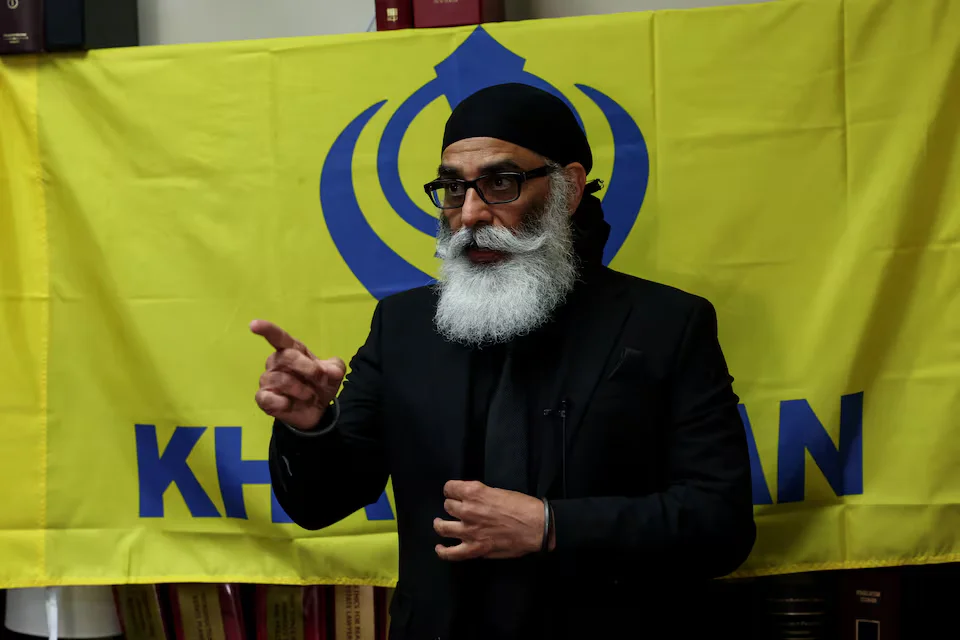Canada and the U.S. must adopt a tougher stance against Indian Prime Minister Narendra Modi’s government. They should do this for attempting to silence dissidents on foreign soil. Gurpatwant Singh Pannun, a controversial Sikh separatist and the target of an alleged India-led murder plot, stated this in an interview. Pannun, a dual U.S.-Canadian citizen, claimed that India’s consulates in the U.S. and Canada operate a “spy network in US and Canada.” However, he did not provide any proof.
The U.S. Justice Department has unsealed indictments against two Indian nationals in connection with an alleged plot to kill Pannun in New York. The two accused include an ex-government official, who the indictment said worked as an intelligence officer at the time and had orchestrated the assassination plan
Pannun told Reuters earlier this month that the Modi government should not conduct hostile activities in foreign countries. He claimed that India’s consulates in the U.S. and Canada run a “spy network,” although he did not provide any proof.
He said that the U.S. and Canada “need to put their foot down and ensure that regimes like Modi’s should not come to America or Canada, challenge their sovereignty, and get away with it. They need to take a firm stance and close the consulates permanently.”
Pannun did not elaborate on the alleged spy network. Similar assertions have been made by Sikh activists in America and Canada.
India’s foreign ministry did not respond to detailed questions from Reuters regarding Pannun’s allegations. India, where Pannun was born, has labelled him a terrorist since 2020.
Authorities in the U.S. and Canada declined comment on Pannun’s allegations.
Diplomatic Tensions and Assassination Plots
The U.S. and Canada have alleged that Indian agents were involved in assassination plots in their countries last year. These plots targeted campaigners for ‘Khalistan,’ a Sikh homeland that some seek to carve out of India’s Punjab state. Sikh militancy in the 1980s and 1990s killed thousands of people in that region.
India has denied involvement in any of the plots.
The allegations have damaged India’s ties with Canada and tested relations between Washington and New Delhi.
Canada’s Prime Minister Justin Trudeau has accused India’s government of involvement in the 2023 murder of Hardeep Singh Nijjar, another Sikh separatist leader in Canada. In May, Canadian police arrested and charged four Indian men for the murder. They are yet to be tried.
India has said Canada has not provided any evidence to support its allegations and New Delhi and Ottawa expelled six diplomats each earlier this month in a growing diplomatic spat.
Investigation into the Murder Plot
However, India has said it is investigating the murder plot against Pannun and U.S. officials have said they want a speedy result.
Pannun said that Vikash Yadav, the former Indian official indicted by the U.S. for the alleged attempt on his life, was just a “middle-tier soldier.” He claimed that higher-level Indian officials assigned Yadav the task of organizing the assassination. He did not offer any proof nor say how he had come to the conclusion.
New Delhi has stated that Yadav is no longer a government employee. However, they did not confirm whether he had been an intelligence officer or specify when he left. Yadav’s whereabouts remain unknown. His family informed Reuters earlier this month that he had been in contact and denied the allegations in the U.S. indictment.
Rise of Khalistan Support
Indian security officials have said they fear that a rise in support for Khalistan overseas may lead to resurgence of militancy that had previously paralysed Punjab state, the birthplace of Sikh nationalism, where the movement for a separate homeland now commands little support.
Pannun has been holding independent referendums in the U.S., Canada, and Europe on creating Khalistan. In the interview, he stated that his movement advocates a peaceful resolution to the matter. He also expressed that the movement will continue despite threats to his life.



![Afghan men search for victims after a Pakistani air strike hit a residential area in the Girdi Kas village, Nangarhar province on February 22, 2026. [Aimal Zahir/AFP/Getty Images]](https://southasiatimes.org/wp-content/uploads/2026/02/gettyimages-2262391441.webp)


